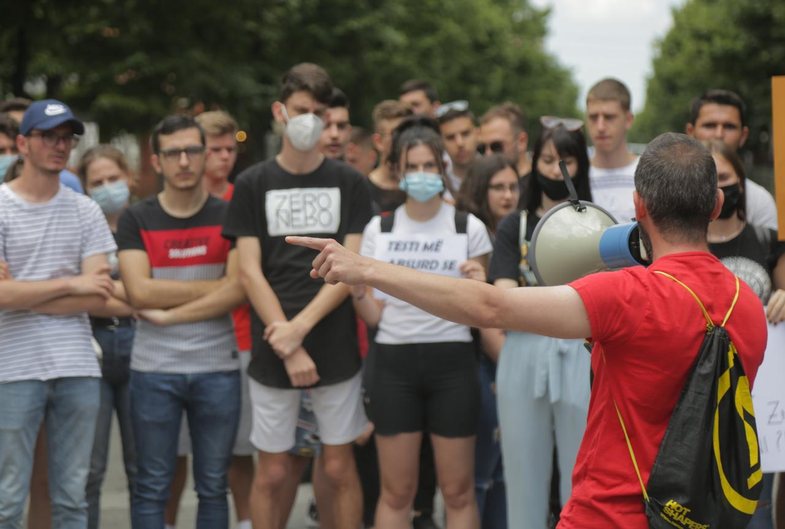
Through a joint writing , Dr. Albana Deda and Dr. Natasha Poroçani, prepared an analysis of the test of Language and Literature entitled "Overview on the test of Language and Literature of the State Matura 2020".
Offending. Dr. Albana (Deda) Ndoja is a lecturer at the University of Tirana, Faculty of History and Philology in the Department of Albanian Language, whose rich CV you can read here . Natasha Poroçani (Shuteriqi) graduated in Albanian language and literature and holds a doctorate in applied linguistics. Poroçani is a lecturer at the ?Aleksandër Moisiu? University and the author of many textbooks in Albania and the Diaspora.
Their joint analysis:
Faced with the collective concern about this year's State Matura test (in fact with tests of other years) and professional and human responsibility at the same time, we decided to consult the test, putting ourselves in the position of graduate, ie by take the questions one by one, despite the fact that we do not yet have the key to the answers, which we think is an obligation to be announced at the time of the end of the exam together with the thesis (The questions are also provided by the Internet.).
Our conviction is that student assessment as a whole is a very important instrument, so we believe that the State Matura exam is closely related to the process of measuring and assessing the skills of each student, as he has completed a schooling process.
In fact this would be the normal case of passing an exam. We say this because the design of the thesis itself is a great responsibility, which must be exercised carefully, without bias and with scientific correctness. Ambiguities in interpretation, "Lapsuset" (Far be it from mistakes!), Spelling mistakes we think are intolerable.
In this context, far from the irritation of the first consultation with the thesis, we tried to read it calmly and objectively, depending on the information that the student has received. During this process we have noticed these controversial elements ("pencils" or "mistakes" let those who will read them judge us) both in wording of questions, as in the alternatives given and one must be chosen, as in the terminology used, so even in spelling mistakes etc.
We clarify that some of the other benefactors of this topic that we are discussing may find themselves in some of these elements (which may even have been expressed on social networks), but precisely because of the effect of the source and the fact that we worked in parallel, we do not we are mentioning them here.
We said a while ago that we noticed problems in formulating questions. One such case is the first question which says:
I.
The first question: Which of the following alternatives is a suitable and effective thesis for a persuasive essay related to volunteering?
It should be noted that in the learning process (see the text Albas, Medaprint, etc., as well as the Dictionary of the Albanian Language, 1980), the student takes the term "topic" for an essay and not "thesis". While the term "thesis" refers to an important building block of an argumentative essay.
Also, the term "persuasive" is not related to the format of the essay as a way of writing, it has to do with the function, so in the literature obtained the student does not have a persuasive essay, but an essay with a persuasive function.
II.
The second question is formulated as follows: "Which of the following sentences can continue in the same style the action started in the paragraph given above?"
It must first be said that the unit of "action" here is more like an unnecessary borrowing of the word "action" (in part). The question induces, as far as we understand, an action = accelerated, rapid, active action, etc., while at least the paragraph given does not leave the impression of the meaning of the word "action" found in the Dictionary of the Albanian Language (an action of thoughtful, organized with a certain purpose: ACTION m.1. libr. Focused action for certain purposes; action in a dramatic work. Joint actions. Diplomatic actions. Action of the work (of the part). Throw in the action. The action takes place.
2. usht. Fighting action to give the enemy a quick and sudden blow. Bold action. Shares of partisan (guerrilla) squads. Place of action.
Do (perform, prepare) an action.)
Even if the student perceives the person who wrote the question as we like, we think we could select two alternatives:
-B (Turi jumped to the right to avoid the rock ....)
-D (Meanwhile, the cold water of the river continued to crash on the side of the boat, making Turin porridge ..)
We say this because both are in the context of that turbulent situation that arises suddenly and unorganized, or for a specific purpose, that may be questioned. Even with a different logic, alternative D could precede Bne in the narrative.
(It should be added that even texts that exceed the size of a sentence must have the author's name attached, as they must be representative texts. Such were the case this year.).
III.
The third question poses this question: The teacher has given you to write a narrative essay about a period of your life where you have successfully overcome a difficulty. Which of the following alternatives is a suitable and effective introduction to such an essay?
Having reservations about the narrative term, which in the textbooks used today in school is found with its narrative synonym, ie narrative texts, we claim that the entries in the essay are not dictated by the teacher or test compiler with ready-made formats, much less narrative essays. , which include types of literary text in general, which does not have to be part of the template composition. Its constituent units belong to the author's compositional unit. This tells us that all the alternatives that the text compiler provides are suitable for entering a narrative essay.
However, regarding the concrete question, we believe that alternatives A (School is the source of many difficulties ...) and C (During my life I have faced many obstacles ...) can be suitable for both.
IV.
Question four: Read this essay topic: "Choose a group you belong to (city, school, team) and explain why getting involved is important to you."
The theme of the essay is constructed in a truncated way, as the words in parentheses indicate: an administrative unit, an educational unit, and a sports unit, but not the community of these units (a team can be discussed). The correct one would be: "Choose a group you belong to (city community, school, teammates) and explain why getting involved is important to you."
If we refer to the first two alternatives, we think that thesis and antithesis are given at the same time [A) Some students complain a lot about the school, but not me, as it is important to follow it every day .; B) Some people do not consider the community a city of this size, but the people who live here know the value of being together.].
We are obliged to make this clarification precisely because these alternatives are preceded by this question: Which of the following alternatives is a suitable thesis for this essay?
And the student connects the thesis unit with the argumentative essay and its constituent elements thesis / antithesis.
Regarding the selection of the correct alternative, we think that all four alternatives can be developed in this essay. So all alternatives stand.
V.
Questions eight, nine, and fifteen (the latter also have other problems) have a very vague connection with language. If the text were elaborated, they could fulfill the observational aspect and the interpretation through writing, but in these cases they have nothing to do with the linguistic and literary formation of the student. Advertising and illustrations are secondary elements that can be treated in tests that assess management or advertising skills, or even art criticism, but never measure skills in a test of Albanian language and literature.
VI.
Question ten. When referring to the two sources related to the word music in the Albanian language, wouldn't it be correct for the test compiler to cite the sources from which these definitions were taken? This would clarify doubts about how the explanation was given. In fact we explained above that each text more than one sentence should have this reference, but this one is necessary because dictionaries of different types have a specific drafting methodology. This can help the student in answering, that he has learned how to clarify meanings at least in a lexical dictionary. And for this knowledge he has been tested.
VII.
Question twelve. Which of the sentences in the text of question 11 expresses a fact?
In our opinion there are two alternatives expressing one fact:
A) Lack of salmon in the waters of our oceans is a signal of a crisis;
D) Pesticides and fertilizers used in the fields are absorbed by the soil and end up in the waters of the planet.
On the other hand, we think that the quality of the question is beyond the context of the construction of the non-literary text, which has been selected, and is even a complete peripheral information in the context of the specificity of this exam.
VIII.
Question fourteen: Which of the following statements is an example of a given implication?
This question requires cognitive-pragmatic testing of the student. According to us, at least two alternatives bring implied data. [Children watch more television than they learn; C) Children do not spend much time talking to their parents. ]
IX.
The fifteenth question gives a picture, where a climber is given, climbing the mountain which is accompanied by clarification: The following photo conveys to the viewer the message ...
In order not to repeat the remark about the inadequacy of such a question with the type of exam that is being given, we are focusing on the messages. We claim that if the picture were clear (quite blurry), we could say that the woman (or the girl, or the lady, or the old woman, because she doesn't look), may be challenging her age, that is, time (with rain, perhaps), but also challenging the mountain (at least it seems so, as it seems). This means that we can minimally choose two alternatives A (Man in challenge with age) and C (Man in challenge with nature), but also the other two can be discussed.
X.
Question Nineteen: In which of the following sentences do words or clusters of words in its composition indicate the source of communication?
The request is not clear if it is a source of communication (ie something that is reported, a news item) or a source of information? This is followed by three very similar alternatives: if a source of communication is required (CONDITION m.1. Action according to the meanings of the verbs KUMTOJ, KUMTOHET. Announcement of the decision. News announcement. 2. Announcement or announcement made orally or published in a newspaper , magazine, etc.; press release. official announcement.) then in alternatives A, C and D the source of communication is Schultz, while if information source is required is also Schultz, but also the magazine "Business Insider". So the question is not clearly constructed to specify the answer objectively.
The phrase syntagm of words, which has already been replaced by a group of words in pre-university texts (or syntagm in university texts), may not impress us.
XI.
Question twenty-one: Which of the sentences is constructed correctly according to the syntactic ratios of its limbs?
We consider that the first three alternatives are erroneous, which have to do with syntactic relations, and the fourth, since it is a translation, has a very controversial point of view, which can be seen as a spelling mistake. One can also discuss the larger spelling of the sentence in parentheses, as well as the proper name, which is not Albanianized according to the standard (It is similar to Georgia (the latter is better known; it has the same nature of the summer season , as well as good food, ?Schultz writes.
So all four alternatives show up with problems even what we think may have been left as correct.
We are giving the other wrong alternatives, in our opinion:
A-The coastal city of Saranda with its crystal clear waters, stunning beaches and numerous cultural and archeological monuments, are listed among the 6 places to visit now ... etc. the keyword in the singular and the predicate in the plural.
B -... explaining that it feels like Europe has become a kind of destination .... etc-misuse of the plural noun.
C-Lesser known places- the name "places" takes the adjective in the feminine gender "known".
XII.
The twenty-second question in the correct version also has a spelling error, as the familiar adjective must fit the name ambiguity required for familiar places, not familiar places.
XIII.
The twenty-fourth question has this requirement: In the sentence: "... it expresses the hard side of Albanian life", the word in black refers to ...
If you notice who is black, you notice that from a morphological point of view there are two words and not one word, one is the preposition in and the other is the pronoun. So even here we have problems in formulation and conception.
XIV.
The twenty-sixth question says: In which of the following sentences is the transitive verb used
The alternatives are:
A-He is presented to us as an ancient oak full of thorns.
In the field of this literature he is not a bar thread.
C-Fan Noli stands alone in Albanian literature.
D-His tongue holds the sound of the earth's sound.
The analysis shows that Alternatives A and D have transitive verbs. We clarify the case of alternative A, which we know will be discussed. According to Grammar I (Academy of Sciences, 2002) a verb is transitive, when accompanied by a right adverb without prepositions, without prepositions, used in the active and inactive form (after receiving diathesis), and names an action that does not remain in he who commits it is going and falling to one person or another. (F.265). Here it is said that verbs that take the oblique opposite without a preposition occupy an intermediate place, since the action here passes to an oblique adverb without a preposition. For this reason they are called oblique transitive verbs.
In this alternative we are exactly in this context, as the verb has the opposite inverse. What emphasizes the transitivity of this verb at least formally is the fact that the verb is in the intransitive form and generally appears as a verb in the middle diathesis. We reiterate that, according to this grammar, it is the transitive verbs that are used in the active and inactive form and get diathesis, while the non-transitive verbs come out without the opposite and usually in the active form and do not get diathesis. We believe that here we are dealing with transitive verbs.
In conclusion, this question also has two correct alternatives.
XIV.
Question twenty-nine. In the sentence: "He is not the poet of ethnic heights, but he is the writer of the earth's plis, therefore Fan Noli, both for his poetic formation and for his linguistic expression, stands alone in the Albanian literature.", The underlined conjunction is ...
According to Grammar, the unit therefore appears as an adverb (Because it used this field weapon, so our work was not rusted. P.366) and as a concluding coordinating conjunction (I found it difficult to see it in the eye, so I looked at the wave of abducted. p.406).
However, it is not mentioned in the derivative conjunctions, despite the fact that even a simple student, at least in the illustrative sentence of the concluding conjunction, can clearly distinguish the action of the second sentence as a result of the first one.
We do not want to discuss here the status and debates that arise if you look at these two examples, which are quite controversial. Grammar does not give a clear and identical criterion for them (When it is an adverb it says it is replaced by the group because, for a reason, while when it is a conjunction it looks at the corresponding semantic relations which are quite debatable and with the consequence, which is not mentioned at all. ) In this context, we consider the debate inappropriate as a question for this level of student and for these problems unsolved by specialists.
XV.
Question thirty says: The function of the group of words preceded by the participle in the sentence: "He is presented to us as an ancient oak full of thorns: a solitary oak, but with well-rooted roots in the depths of the earth" is he ...
We think that demand has a conceptual problem. The units found after the participle form two groups with different values, despite the fact that they are both circumstantial but different. So it should not be the group of words, but the groups of words and this distracts the student in response.
Good luck to them that both groups happened to be coincidental.
XVI.
The fifty-third question poses this question: The situation conveyed in this passage is: dramatic or heroic? It?s actually dramatic because one of Athens ?heroes is dying, but the spirit is heroic in keeping with the spirit of the epic. So here too we judge that there may be two alternatives that can be chosen.
XVII.
Question fifty-four again shows the word "action", but no longer in the sense of question 2. Here it is used in the sense of the noun action and does not constitute a term found in any text of the Albanian language at the pre-university level. Add here the various semantic nuances that its use has in the two questions, which is found and think about how it can be analyzed by the student.
The submission given above is in fact partial at the moment, that we have not announced the key to the answers, which would probably raise other discussions (We wish not.).
Likewise, in these remarks we have not included scientific errors that come from the reference in the Grammar of the Academy of Sciences. A classic case is question 16 which requires the title of the text on Saranda without using a verb. The alternative we believe in is correct, according to the test compilers and the material taken in the pre-university textbooks is wrong for us, as the past participle is not considered a verbal form, since it does not take the subject (with one exception).
Our argument in this case (and not just ours) is that it, beyond the standard, formally does not take the subject, as there is no extended paradigm (other than the active and inactive form) and there is no self (Adaptation of the predicate to the subject in itself and in number.).
On the other hand, the infinitive of the standard and not only take the opposite and circumstantial and the latter depend on the predicate verb. (It could be: Saranda, the city to visit all of us right away).
Likewise, the correct variant (Saranda, the city to be visited as soon as possible) has this form in the inactive form and the active and inactive form are the forms that the verb takes when used in different diatheses (Even the concept of diathesis as a category morphological has already been discussed as a valence process.).
Of course when designing such opposition theses we think it should be specialized to at least avoid controversial problems from the test.
In this material that we presented with great kindness, trying to be as likely as possible (lack of answers and certified test) objective and with arguments, but in no way arrogant and categorical, we are aware that there are also issues others that can be discussed, which are similar to the test given, the calculation of the response time and the difficulty of deciphering and analyzing the requirements, the type of questions and the importance, or their suitability in relation to the subject, as well as and the quality of the questions related to the stylistic analysis of the texts.
In this context we are also aware that there are things that can be discussed in any of our remarks, which unfortunately are not one or two. However important we think it is to be open to debate and closed to the monopolization of the process.
The victims are ultimately our children. Let?s not play with their emotions. It's never too late for that.





